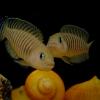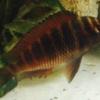QUOTE
"Malawi bloat" is a disease perptuated by microscopic flagellates (parasites) that are commonly found in healthy fish. These one-celled protozoans reproduce by binary fission. They can occur on the skin, in the intestine, internal organs, and in the blood of fish.
Intestinal flagellates can be found in many fish which they do not harm. The pathogenicity of the organism varies from fish to fish. Thus, Angelfish may not be affected at all by the same flagellates that damage say a Discus. The intestines of these fish can contain millions of flagellates averaging in size of about 8-12 microns. Here is a list of some commonly known flagellates:
A. Hexamita
B. Spironucleus
c. Trichomanas
D. Bodamonas
E. Protoopalina
The most recognized are the first two.
Most researchers support the view that some of these protozoans reside in the intestines of healthy fish (dormant), but can proliferate to harmful numbers under stressful conditions.
Here is a recent quote from Ad Konings from his book Back to Nature Guide to Malawi Cichlids 2nd. edition pg. 46:
"Malawi Bloat is believed to be caused by a flagellate (a unicellular animal, a protozoan). This flagellate occurs in the intestines of all Malawi cichlids but normally causes no harm since the fish's immune system can cope with it. However, in a stressful situation such a balance may disappear and the fish may lose its resistance against an outbreak of a flagellate "attack". This often leads to bloat."
Fish are very good at fighting off disease, but when exposed to stressful conditions over a lengthy periods of time their immune systems weaken, thereby exposing them to the possibility of contracting various diseases. Under "stress" the organism multiplies causing considerable localised damage. Once severe enough, the intestinal lining is penetrated and the organism enters the blood causing systemic and organ infections. In large numbers they can block the intestinal tract of a fish creating the"bloat"effect.
Some stressors:
1. Low oxygen (O2) levels
2. High nitrite (NO2) levels
3. High nitrate (NO3) levels
4. High ammonia levels (NH3)
5. High or low temperature levels
6. Water pH
7. Lighting
8. Rough handling fish
9. Overcrowding
10. Not enough shelter
11. Harassment
12. Excessive salt
13. Improper diet (specifically herbivores)
What one should remember, is that the parasitical outbreak is brought upon by any number of stressors (some listed above), many times in conjunction with one another. Therefore, sometimes the best way to treat a disease is to prevent it from ever happening. A clean non-stressful environment will breed colorful, thriving cichlids.
If they get bloat from diet, is this in fact something different from bloat due to internal parasites?
No. They are one in the same. Diet in this case being the "stressor".
Is bloat only caused by these parasites, which in turn only become a problem if the fish is too stressed, which in turn can result from any number of causes, including diet, excess salts, etc?
As far as what has been proven, yes. Although, some tend to argue bloat can be bacterial in nature. I tend to agree with experts who feel bacterial complications are secondary in occurance only after the parasite has intially infiltrated the host.
Intestinal flagellates can be found in many fish which they do not harm. The pathogenicity of the organism varies from fish to fish. Thus, Angelfish may not be affected at all by the same flagellates that damage say a Discus. The intestines of these fish can contain millions of flagellates averaging in size of about 8-12 microns. Here is a list of some commonly known flagellates:
A. Hexamita
B. Spironucleus
c. Trichomanas
D. Bodamonas
E. Protoopalina
The most recognized are the first two.
Most researchers support the view that some of these protozoans reside in the intestines of healthy fish (dormant), but can proliferate to harmful numbers under stressful conditions.
Here is a recent quote from Ad Konings from his book Back to Nature Guide to Malawi Cichlids 2nd. edition pg. 46:
"Malawi Bloat is believed to be caused by a flagellate (a unicellular animal, a protozoan). This flagellate occurs in the intestines of all Malawi cichlids but normally causes no harm since the fish's immune system can cope with it. However, in a stressful situation such a balance may disappear and the fish may lose its resistance against an outbreak of a flagellate "attack". This often leads to bloat."
Fish are very good at fighting off disease, but when exposed to stressful conditions over a lengthy periods of time their immune systems weaken, thereby exposing them to the possibility of contracting various diseases. Under "stress" the organism multiplies causing considerable localised damage. Once severe enough, the intestinal lining is penetrated and the organism enters the blood causing systemic and organ infections. In large numbers they can block the intestinal tract of a fish creating the"bloat"effect.
Some stressors:
1. Low oxygen (O2) levels
2. High nitrite (NO2) levels
3. High nitrate (NO3) levels
4. High ammonia levels (NH3)
5. High or low temperature levels
6. Water pH
7. Lighting
8. Rough handling fish
9. Overcrowding
10. Not enough shelter
11. Harassment
12. Excessive salt
13. Improper diet (specifically herbivores)
What one should remember, is that the parasitical outbreak is brought upon by any number of stressors (some listed above), many times in conjunction with one another. Therefore, sometimes the best way to treat a disease is to prevent it from ever happening. A clean non-stressful environment will breed colorful, thriving cichlids.
If they get bloat from diet, is this in fact something different from bloat due to internal parasites?
No. They are one in the same. Diet in this case being the "stressor".
Is bloat only caused by these parasites, which in turn only become a problem if the fish is too stressed, which in turn can result from any number of causes, including diet, excess salts, etc?
As far as what has been proven, yes. Although, some tend to argue bloat can be bacterial in nature. I tend to agree with experts who feel bacterial complications are secondary in occurance only after the parasite has intially infiltrated the host.
The quote below is far from the truth..
QUOTE
If it's just a Tropheus tank then i would stick to an all vegi base diet, if you also have meat eaters as well you just need to use some tricks to keep them away from the higher protein food as much as possible
There is NO such thing as too much protein in fish feeds, it's the digestibility of the feed/protein which is important. Also there is NO such thing as a 100% herbivorous fish, all fish are opportunistic feeders! Anyone who has ever kept/ bred Ts. will tell you that Ts. will HUNT their own fry and eat them if they could. If they are a 100% herbivorous fish what is the reason behind this? Although they are classed as a “herbivorous fish” In the wild Ts. feed on many crustaceans that live on algae beds, this is how they get their protein, in turn how they grow. This has been common knowledge for a long time now.
As mentioned above stress is the number one killer, moving Ts. from one tank to another is simply enough (sometimes) to give them bloat. Even a good thing like a water change can sometimes stress them out and you could end up with a case of bloat. Don't change things, keep it simple. Make sure you match your water to the tank water when you do water changes, pre mixed with correct temp, balanced PH/GH/KH etc etc.
Bloat can be cured very easily, Ts. Should ALWAYS look/be hungry, if you notice otherwise treat them straight way.














